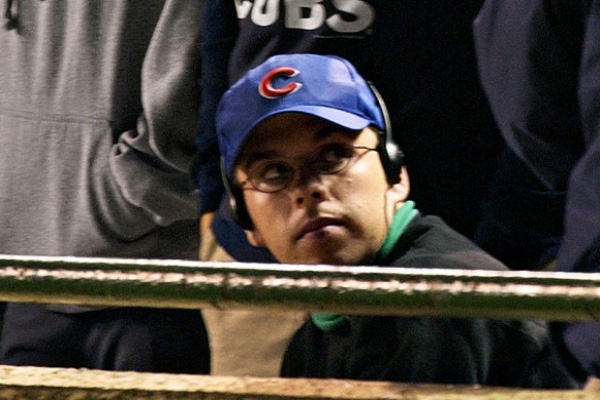Genre: Drama
Premise: Steve Bartman, the infamous Cubs fan who changed the fortunes of the Chicago Cubs forever, tries to pick up the pieces of his life after inadvertently thwarting a championship.
About: This script finished top 10 on last year’s Black List!
Writer: John Whittingong
Details: 104 pages
Let me take you back in time.
The year was 2003.
My Chicago Cubs (my favorite sports team on the planet) were 5 outs away from going to the World Series. The last time that had happened?
1907.
In the city of Chicago, where I grew up, entire generations of fellow Cubs fans had grown up AND DIED, never to see their team even have a shot at the championship.
And then 2003 came.
Not only were the Cubs good, they had quickly become the favorites to win the championship. They were one game away from a trip to the World Series, up 3-1, with only 2 innings left to go.
At the time, I was in Los Angeles, teaching a tennis lesson, and I stopped the lesson to check the radio in the pro shop. Cubs up 3-1. 8th inning.
For those unfamiliar with baseball, when you’re up 3-1 in the 8th inning, you have a 95% chance of winning the game.
I went back into the lesson confident that I’d be watching my Cubbies in the World Series. I mentally calculated plane ticket prices as I dreamed of watching one of the games at Wrigley Field. A half an hour later, I came out to check the final score. What I saw that day tore a hole in my heart that’s never quite been re-filled.
Florida Marlins 8
Chicago Cubs 3
WHAT
THE
FUCK???
I drove home in a daze, wondering how this could’ve happened. Scoring 7 runs in a single inning was unheard of. There had to be an epic meltdown.
It turns out there was. And it started when Steve Bartman, a fan at the game, got in the way of a Cubs outfielder trying to make a catch that would’ve solidified the win. If you talk to Chicago Cubs fans these days, the narrative is that Steve Bartman didn’t cost the Cubs the game. The Cubs cost themselves the game.
I find that to be utter politically correct bullshit. I believe, without a shadow of a doubt, that Steve Bartman cost the Cubs the World Series. Had he not gotten in the way of that catch, there would’ve been two outs instead of one, the Cubs wouldn’t have been as shaky. The plethora of mistakes that followed would never have happened. And the Marlins would’ve faded.
Steve Bartman is a fascinating character for that reason. The ultimate Cubs fan. Now a symbol Cubs’ futility. And the crazy thing? He’s never been seen since that day.
Which is why someone writing a script about him is so weird. Today’s writer is taking a real person, who’s still living, telling us the true story of what happened to them that day in the first half of the script, then completely inventing what happened to him after he left that game. I’m not sure I’ve ever seen a script do this before.
The first half of True Fan introduces us to Steve Bartman as he gets ready to go to the game that will change his life. He’s going with a couple of work friends, although the term “friends” might be a stretch.
You get the sense that Steve, a 26 year old who still lives with his parents, only has one friend. And that’s the Chicago Cubs. Steve is so much a fan, that he doesn’t just go to the game. He brings a walkman so he can LISTEN to the game while he watches it AT THE SAME TIME.
Obsessive? Yeah, a little.
The script takes us through the harrowing aftermath of Bartman after he prevents the catch. For those who don’t know the story, when Bartman screwed up the play, the Cubs were up 3-1. After that, the Marlins started scoring runs. 3-2, 3-3, 3-5, 3-6, 3-8. As the fans at Wrigley Field got further and further away from victory, they turned their anger on Bartman.
One fan actually walked up and poured beer right on Bartman’s face. But that wasn’t the worst of it. People started screaming death threats. Soon, security had to come down and save Bartman from literally being pulled apart.
Bartman’s name had become so famous by the next day, that people actually came into his work overnight and destroyed his desk and computer. This wasn’t some internet meme. People hated this man.
This is where things segue into the fictional world. I know this because no one from the media has spoken to Bartman since that day. So there’s no true record of what Bartman did.
Anyway, in our story, Bartman moves to Baltimore to escape being the most recognized man in Chicago. He lives a quiet life, still haunted by the foul ball he tried to catch, made worse by the fact that his father recently passed away, and he feels responsible for robbing him of a World Series.
In Baltimore, Bartman meets Annie, a bit of a nut job, but more importantly for Bartman, someone who knows nothing about baseball. The two start a relationship, and Annie slowly encourages Bartman to get his baseball mojo back. There’s a series in town between the Orioles and the Cubs that the two go to, and Bartman finds his love for the sport rekindled.
But eventually, Bartman will have to decide if he’s going to spend the rest of his life on the lam, or if he’s going to move back to his home city where his favorite team still plays.
Let me start off by saying John did something that I didn’t think was possible. He made me feel sympathy for Steve Bartman. Seeing this unfold from Steve’s eyes as opposed to an angry fan’s eyes made me see the botched catch in a whole new light.
I think that’s a good screenwriting lesson. A story can become completely different depending on who’s eyes we see the story unfold from. A murder can be covered in two different ways depending on if we see it through the murderer’s eyes or the victim’s eyes.
Where True Fan gets weird is in its structure and in its love story. The structure here is bizarre in that the first half of the script is dedicated to the build-up and coverage of the infamous foul ball. The second half, then, is the love story.
It’s very unconventional to introduce your love story halfway into the script. You don’t have enough time to put the relationship through its paces. You’re going to be rushed. And that’s what happened here.
Because we only had half a script, John was forced to throw Annie at us hard (she comes onto Steve in the grocery store) and then practically force Bartman to go out with her.
If we stick to the rule that the best writing is born out of truth, then this was not John’s best writing. I have lived an entire life in grocery stores and never once has a girl come onto me or asked me out. Not only does that never happen, but this is STEVE BARTMAN we’re talking about. Look at that picture up above. Is the one time when a girl hits on a guy at the supermarket going to be with that man? I think not.
And it’s these choices that bother me. Once you start doing things that WOULD ONLY HAPPEN in the movie world, you’re no longer telling the truth. You’re a liar. And the audience senses that lack of truth. I’m not sure True Fan ever recovered from that.
However, because of this weird freaking character and this unique situation, you’re compelled to keep reading. And while there are no home runs hit, there are a few doubles.
I liked, for instance, when Steve and Annie went to the Orioles-Cubs game. Where do you want to put your characters, guys? IN THE LAST PLACE THEY WANT TO BE. If you put your hero in places he doesn’t want to be, you’re usually going to get a good scene out of it. Going to that game, with the potential of being seen, kept me invested in Bartman’s story.
But John runs into a final problem in that Bartman’s story doesn’t have an ending yet. He’s never talked to the media. Ever. So how can his story end in a satisfactory way?
The answer might come this year. The Cubs are, once again, a few games away from the World Series. If the Cubs win the series, Bartman’s mistake will finally be forgiven. So maybe that’s the ending. It just hasn’t been written yet.
[ ] What the hell did I just read?
[ ] wasn’t for me
[x] worth the read
[ ] impressive
[ ] genius
What I learned: Whenever you’re telling a story or even just writing a scene, ask this question: “Am I telling this story through the most interesting person’s eyes?” Is your break-up scene more interesting told through the dumper’s or the dumpee’s eyes? Is your road rage scene more interesting told through the guy’s eyes who got cut off or the guy who cut him off? Is your serial killer film best told through the killer’s eyes, the victim’s eyes, or the detective’s eyes? Or a combination of all three? You never know. By sliding the point-of-view just one character over, a boring scene can quickly become the best scene in your script.



